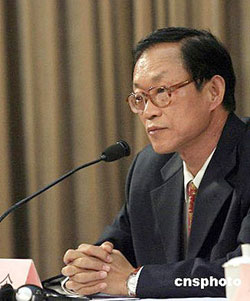China opposed more Sudan sanctions
By Qiang Pen (China Daily)Updated: 2007-05-30 07:05
 Liu Guijin, China's special envoy to Africa, briefs reporters on his fact-finding visit to Sudan in Beijing May 29, 2007, and said China opposes expanded sanctions against Sudan. [cnphoto] |
"Imposing new sanctions only makes the problem more difficult to resolve," China's recently-appointed special envoy to Africa Liu Guijin told a news conference after a fact-finding trip to Sudan.
Expanding sanctions is the last thing that should be done, especially at a time when signs of progress can be seen in Darfur, including talks between Khartoum, the African Union (AU) and the UN, Liu said.
"In these circumstances, why can't the international community give more time for a peaceful settlement of the problem?" he asked.
China is encouraging Sudan to be "more flexible" about implementing a peace plan, and also wants fragmented opposition forces in Darfur to join talks and reach a unified negotiating position, he added.
The third and final phase of the plan, agreed between the UN and Sudan in November, foresees the deployment of a joint AU-UN force: 17,000 troops and 3,000 police officers.
Beijing said earlier this month it would send 270 military engineers - for a UN force to bolster African Union peacekeepers already in Darfur - as an initial step in the peace plan, which Sudan has accepted in principle.
Political negotiations should go hand in hand with the implementation of former UN chief Kofi Annan's three-phase peace plan, Liu said.
Liu also urged some countries not to politicize Sino-Sudanese energy collaboration, saying it was normal business activity and has, indeed, helped social and economic development in the poverty-stricken country.
Liu said poverty is the real cause of the problems in Darfur; and development is the solution.
Over the past years, China has donated more than $10 million to the region, some in the form of humanitarian aid such as rice, and the rest in development aid such as building schools, water projects and power generators.
In brief remarks at the White House yesterday, US President George W. Bush followed through on a threat made six weeks ago to pursue tougher action against Sudan.
Bush directed Secretary of State Condoleezza Rice to consult with Britain and other allies on pursuing new UN Security Council sanctions against Sudan.
The aim of a new resolution, he said, would be to impose new sanctions against the Sudanese government and officials found to be violating human rights or obstructing the peace process, and to enforce an expanded embargo on arm sales to the government of Sudan.
"It will prohibit the Sudanese government from conducting any offensive military flights over Darfur. It will strengthen our ability to monitor and report any violations," he added.
As part of the tightening of US sanctions, Bush said the US Treasury Department will bar 31 companies owned or controlled by Sudan from doing business in the US financial system, including a company he said that has been transporting weapons to the Sudanese government and militia forces in Darfur.
Khartoum criticized the sanctions before they were even announced.
"I think these sanctions are not justified. It is not timely. We are cooperating well with the United Nations," Mutrif Siddig, Sudanese undersecretary for foreign affairs, said in Khartoum.
Agencies contributed to this story
|
||
|
||
|
|
